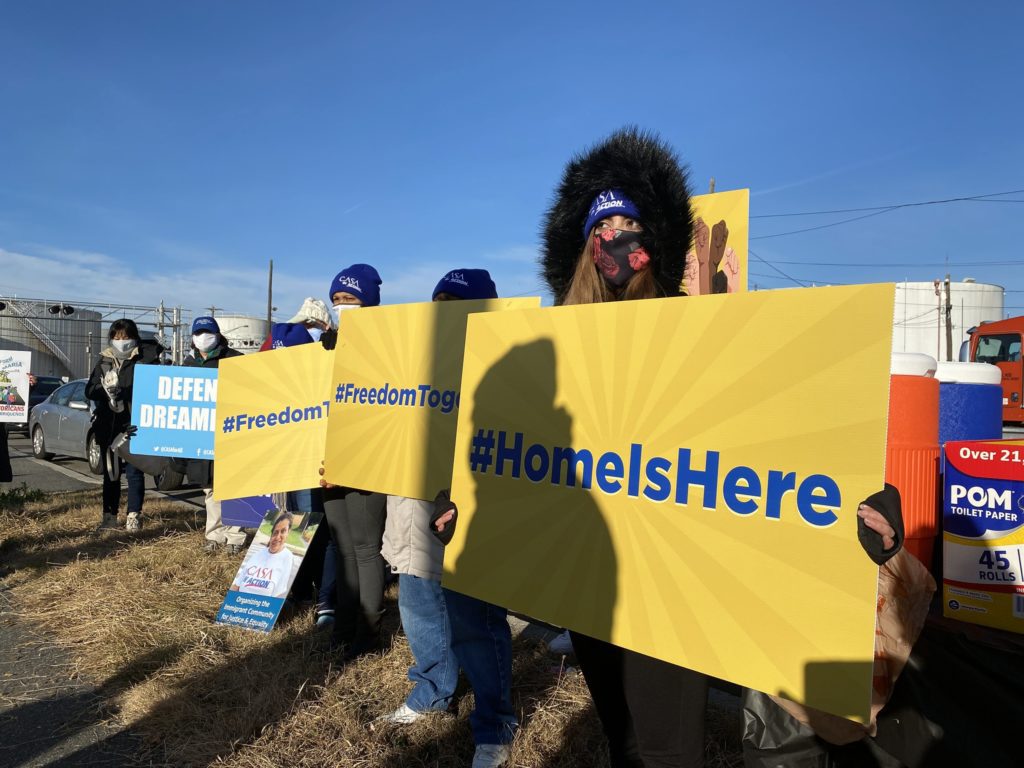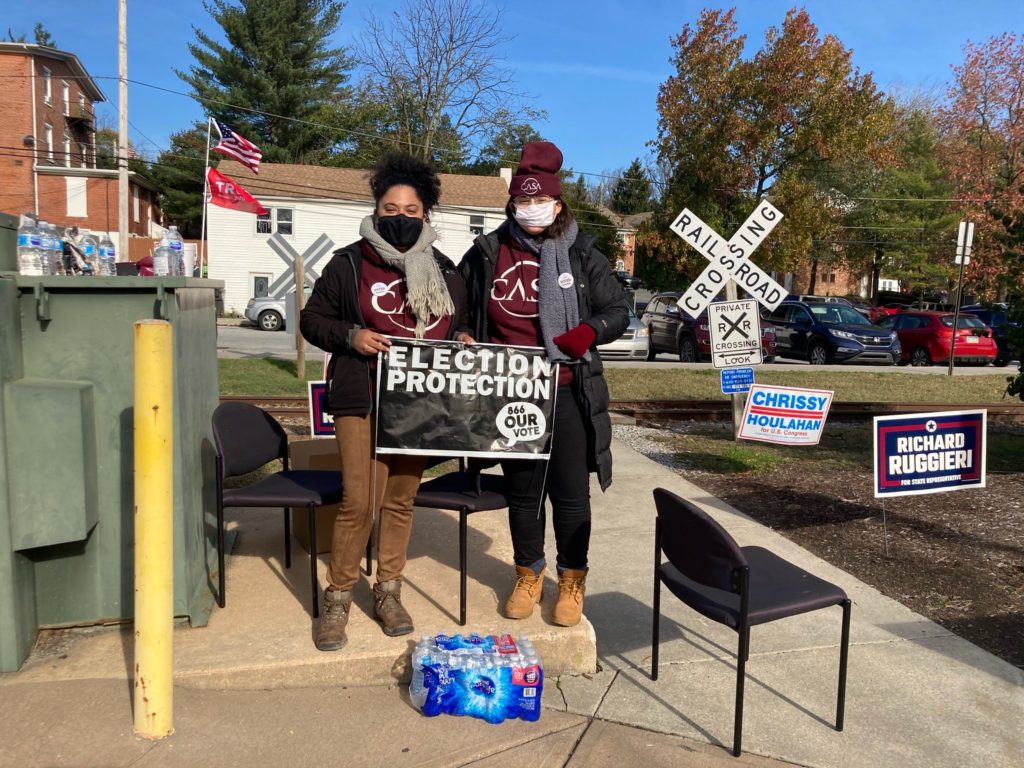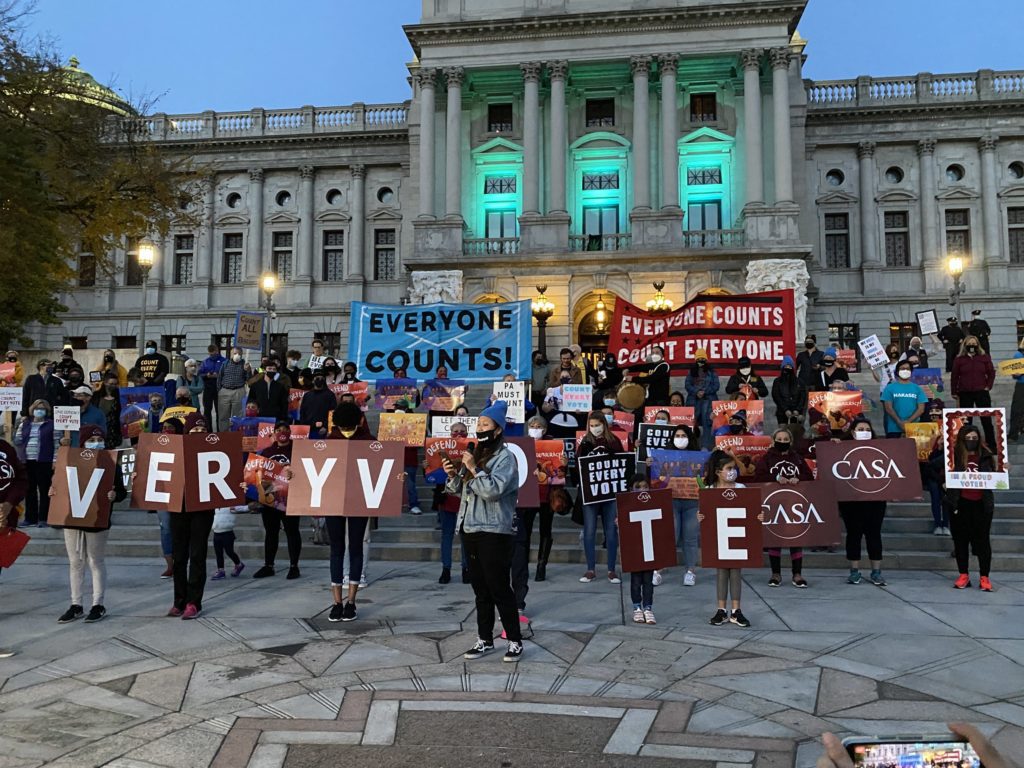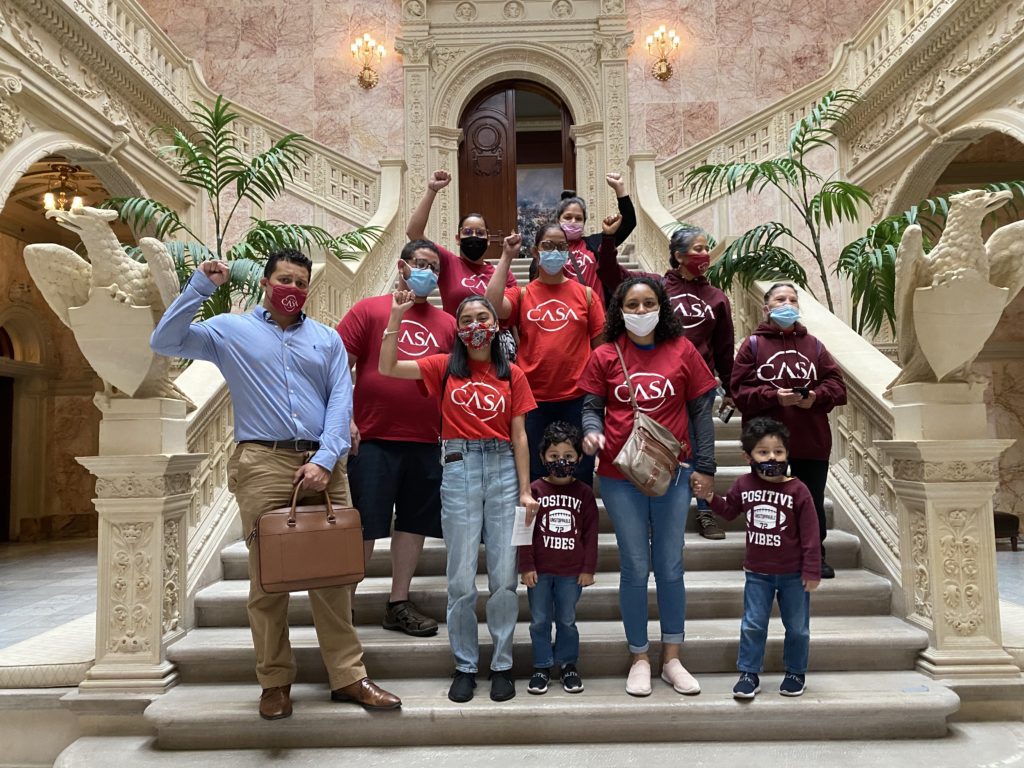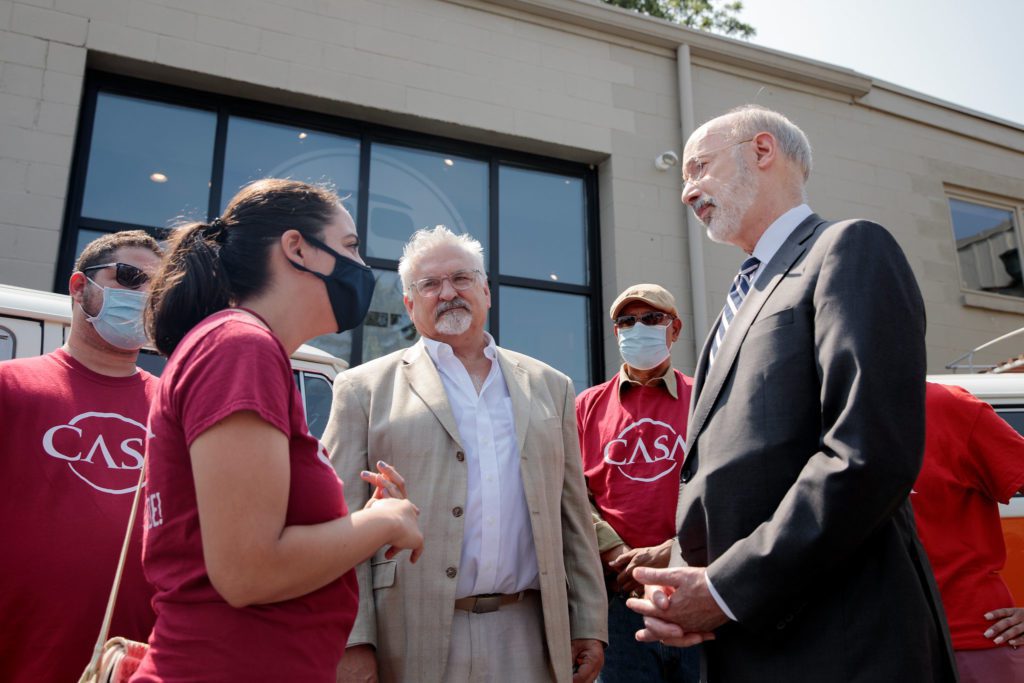Chapter 2
2021, The Year
CASA Would Not
Stand Still
This year, CASA was determined to not only survive but to evolve to meet much needed community support and solidarity. Because 2021 was a year of sustaining what we have and growing what we need, we can enter into 2022 with confidence and strength knowing that we will continue to build momentum within our movements despite COVID-19.
CASA Services Highlights and Key Stats
Total Volunteers by numbers
The 2020 Election - All Hands on Deck
It is hard to overstate the gravity the 2020 election held for CASA members or indeed for the entire country. Regardless of where people stood, the election held a place of tremendous importance for the future of immigrant and working class communities, and both CASA and CASA in Action knew they had serious and critical roles to play in this work.
CASA’s 2020 Non-Partisan Civic Engagement Program
Program Snapshot
Thanks to their efforts, Latinx communities showed up on election day—voting in record numbers to defeat the obstacles deliberately laid in front of them.
Since 2016, our members have felt the brunt of attacks on immigrant communities, the withholding of critical aid to Puerto Rico, denial of vital COVID relief funding to some of the most vulnerable communities, and repeated and purposeful efforts to undercount, underserve, and otherwise dampen the power of our communities. Despite these challenges, our members organized. They reached out to their friends, family, and neighbors in person, by phone, through Whatsapp, and on Zoom. Thanks to their efforts, Latinx communities showed up on election day—voting in record numbers despite the obstacles deliberately laid in front of them.
At CASA, the work leading up to election day began a full year prior with the launch of our census program. As CASA launched field programs across our footprint, including five expansion counties in Pennsylvania, we invested training and leadership development resources in CASA member leaders and built an army of promotores to discuss civic engagement—the census, voting, and redistricting—within their own communities.
By the time the census campaign wound down in May of 2020, this team of amazing member leaders, from first generation Latinx college students to Puerto Rican grandmothers, were ready to pivot into engaging potential voters in conversations about the upcoming elections. Having this trained and experienced team already on board as the pandemic hit made our campaign more successful than if we had been starting from scratch in June or July.
A critical part of organizing is listening, so our campaign began with a post-primary survey of Latinx voters to learn about their experience voting in the primary. We applied these learnings to both our program design and our election advocacy during the later phases of the campaign and in our education materials about voting by mail. We believe that organizing works – and that having more in depth conversations with voters about issues they care about will make them more likely to show up on election day and take action in other ways. We also recognize that in the middle of a pandemic when so many are suffering, sometimes urgent needs like health care, food, and housing need to be addressed before a voter can really even think about voting
We never stopped engaging voters—even after election day. We invited voters to join us in defending democracy at election defense rallies in Harrisburg immediately following election day and at a mass member meeting on November 22nd, engaging the community around the campaign pledges of the election’s victors: climate justice, immigration, and economic justice.
Now, with new leadership under @DelegateATW & the experience & capacity of a veteran org, we set our sights even higher. With 107k+ lifetime Latino, immigrant, & working class members, CASA in Action is the foremost Latino & immigrant organization in the Mid-Atlantic region. pic.twitter.com/Et8IQpn5sr
— CASA in Action (@CASAinAction) December 21, 2020
Our work
CASA applied this multilayered tactical approach, combining phone, text, field, relational, and digital tactics, to six key phases within the campaign. To take Pennsylvania as an example, see this rundown of our work in the Commonwealth:
- Voter Education – This work included two critical components: education about how elections work in the US and education about the changes to election processes (including voting by mail) taking effect for the first time in 2020.
- Voter Registration – Historically, a massive voter registration gap has existed among the Latinx electorate in Pennsylvania and Virginia, and CASA is dedicated to closing that gap. CASA utilized phone, text, and digital outreach to emphasize to our community — especially the thousands of recently arrived Puerto Rican residents who came to PA since Hurricane Maria in 2018 — the importance of voting, and to help them through the registration process.
- GOTV – Whether by-mail or in person, CASA did the work to ensure folks turned in their ballots, got to the polls and had their votes counted.
- Voter Protection – Voter protection included working with local election commissions and the state authorities to try to get as many dropbox locations as possible, ensuring that information on voting by mail was clear and reflected the reality on the ground vis a vis USPS and state elections authorities, polling place watchdog work for intimidation and irregularities, and post election review for voting irregularities.
- Election Day – On election day itself, CASA mobilized 486 “voter guardians, “ in conjunction with the statewide Election protection coalition, with support from Keystone Counts and the Center for Popular Democracy. CASA Voter Guardians responded to over 100 potential voter protection issues on election day, and were able to resolve the vast majority of cases with the ultimate result of a voter being able to cast their ballot, yielding thousands of “thank yous” from voters, local elected officials, and poll workers for their support in helping the election process run smoothly.
- Post Election Protection – CASA’s voter protection work continued after election day as we immediately launched efforts to ensure that every vote was counted in conjunction with PA Voice, the Election protection coalition, and the statewide and national Fightback tables’ Count Every Vote campaign effort. We joined small gatherings on November 4th in Lancaster and Harrisburg to lift this message, and anchored larger efforts on November 5th and November 7th in Harrisburg to continue to create the public space for democracy to work as it is supposed to, calling on election officials to count every vote and not be rushed or bullied by increasing national pressure to produce final results.
Now, with new leadership under @DelegateATW & the experience & capacity of a veteran org, we set our sights even higher. With 107k+ lifetime Latino, immigrant, & working class members, CASA in Action is the foremost Latino & immigrant organization in the Mid-Atlantic region. pic.twitter.com/Et8IQpn5sr
— CASA in Action (@CASAinAction) December 21, 2020
Our work
CASA applied this multilayered tactical approach, combining phone, text, field, relational, and digital tactics, to six key phases within the campaign. To take Pennsylvania as an example, see this rundown of our work in the Commonwealth:
- Voter Education – This work included two critical components: education about how elections work in the US and education about the changes to election processes (including voting by mail) taking effect for the first time in 2020.
- Voter Registration – Historically, a massive voter registration gap has existed among the Latinx electorate in Pennsylvania and Virginia, and CASA is dedicated to closing that gap. CASA utilized phone, text, and digital outreach to emphasize to our community — especially the thousands of recently arrived Puerto Rican residents who came to PA since Hurricane Maria in 2018 — the importance of voting, and to help them through the registration process.
- GOTV – Whether by-mail or in person, CASA did the work to ensure folks turned in their ballots, got to the polls and had their votes counted.
- Voter Protection – Voter protection included working with local election commissions and the state authorities to try to get as many dropbox locations as possible, ensuring that information on voting by mail was clear and reflected the reality on the ground vis a vis USPS and state elections authorities, polling place watchdog work for intimidation and irregularities, and post election review for voting irregularities.
- Election Day – On election day itself, CASA mobilized 486 “voter guardians, “ in conjunction with the statewide Election protection coalition, with support from Keystone Counts and the Center for Popular Democracy. CASA Voter Guardians responded to over 100 potential voter protection issues on election day, and were able to resolve the vast majority of cases with the ultimate result of a voter being able to cast their ballot, yielding thousands of “thank yous” from voters, local elected officials, and poll workers for their support in helping the election process run smoothly.
- Post Election Protection – CASA’s voter protection work continued after election day as we immediately launched efforts to ensure that every vote was counted in conjunction with PA Voice, the Election protection coalition, and the statewide and national Fightback tables’ Count Every Vote campaign effort. We joined small gatherings on November 4th in Lancaster and Harrisburg to lift this message, and anchored larger efforts on November 5th and November 7th in Harrisburg to continue to create the public space for democracy to work as it is supposed to, calling on election officials to count every vote and not be rushed or bullied by increasing national pressure to produce final results.
CASA Member Testimonials
“This year, I voted for the first time in Pennsylvania. I felt excited and powerful, because I know that my vote here in Pennsylvania will count and will be a voice for my friends and family in Puerto Rico whose votes do not carry the same power. But I was also angry, because I saw just how hard it was for my mother to vote. When her mail-in ballot did not arrive in time, she had to vote in-person yesterday, even though she has cancer and was potentially risking her health by going out to vote. But she was determined to vote, so she bundled up and went to her polling place to exercise her right to vote. Nobody should have to choose between their life and their vote!”
Jazmin Sanchez, Lancaster County voter
“Victories are not born, victories are made through action. On the 3rd of November, my team of promoters and I exercised and witnessed the power of democracy. We saw the power of the people voting for change, to defend the diversity that makes our country’s culture so rich and unique.”
Marilyn Figueroa, Virginia Health Promoter
“Once again, I feel happy that the Latinx community is showing up with our vote in this presidential election. This is my third consecutive time voting. It fills me with joy to see people excited to exercise their right to vote for the reconstruction of a nation that for four years has been battered and mistreated. Our vote is powerful.”
Tomas Berrios, Virginia Voter, CASA member
To go deeper on CASA’s non-partisan election campaign, see our full 2020 post election report!

CASA’s sister organization, CASA in Action, ran a powerful and robust partisan electioneering campaign in Pennsylvania and Virginia during the 2020 elections, and then again in the special “Runoff” election in Georgia in 2020/2021. While this report is specific to CASA, for supporters of CASA in Action’s partisan work, we strongly encourage you to check out:
Advocating for Justice Everywhere — CASA’s Policy Campaigns and Achievements
Federal Advocacy
With a new Presidential administration and a new congress came new opportunities for justice for our members. From day one of the new administration, CASA was committed to holding newly-elected officials accountable to such campaign commitments as economic and climate justice, but in particular, we had one overall goal: citizenship for all.
First 100 Days
Every. Single. Week. That was the plan for CASA’s members and organizers as CASA set about holding a rally, either on our own or with our wonderful partners, every single week during the first 100 days of the Biden administration. Our goal was simple: let the administration know in no uncertain terms that the movement was watching them and eagerly awaiting action on their promise to take action for the immigrant community, and we would not hesitate to mobilize to hold them accountable.
Per figures by the Center for American Progress, the number of people in our core states would achieve legalized residency if CASA is successful in its advocacy this year:
Mayday Rally — We’re Back!
While initial DC actions were modest, on May 1st, a combination of covid-safe rally practices, robust availability of PPE, careful planning, and an improving COVID-19 outlook overall allowed us to hold our first major in-person mobilization since the pandemic began.
On May 1st, or May Day, celebrated around the world as International Workers’ Day, a coalition of immigration justice organizations held a large-scale march and rally in our nation’s capital. Community members and allies from around the East Coast marched to demand citizenship for all 11 million undocumented immigrants, for all immigrants who have toiled as essential workers during the COVID-19 pandemic, for DACA and TPS holders. Above all, we demanded the use of reconciliation to pass immigration reform.
CASA’s Commitment to Climate Justice
For the second year in a row, CASA members named climate justice as their #2 overall federal policy priority, second only to comprehensive immigration reform. Though our push for citizenship for all was the centerpiece of our advocacy at the federal level, CASA put major effort this year into rallying with our climate partners to demand also that the administration take action on climate justice. CASA’s 120,000+ lifetime immigrant, Latinx members know firsthand the real-world impacts of our changing climate.
The environmental movement is powerful only when it is inclusive of the frontline communities most immediately affected by climate change. The work of building a multi-racial, cross-class, grassroots movement for climate justice requires the robust participation of BIPOC and immigrant communities at all levels. Unfortunately, while diversity and inclusion within the movement has certainly improved by leaps and bounds in the last decade, it remains true that BIPOC and immigrant voices are often the only non-white voices in local, state, and regional climate tables, that communications regarding climate justice are often not telling the stories of nor are they targeted directly to those communities most effected by climate change.
The story of the 21st century will be the story of climate migration. While our goal is unquestionably to halt global warming and ensure an equitable transition to a green global economy, we also recognize the realities of the damage already done. There is a pressing need to engage the hundreds of thousands of climate refugees already in the United States, and the millions more who will arrive in the coming decades. How communities, nations, and our world handles massive influxes of people — in addition to how they handle the hugely exacerbated underlying social and economic inequality of those immigrants and BIPOC communities already within their borders — will determine the success or failure of the entire endeavor. As an organization born out of welcoming Central American refugees in the mid-80’s, CASA is fundamentally oriented toward building power in immigrant communities displaced by violence, injustice, and increasingly, by climate change.
This fight is an existential one—regardless of what victories we achieve or setbacks we face, the fight against climate change and for climate justice will continue into the foreseeable future.
Campaigns and Victories by State
Maryland
In 2021, major victories came at the end of a General Assembly session in which a groundbreaking law was adopted to ensure that immigrant taxpayers can access earned income tax credits. In addition, CASA celebrates the passage of a bill establishing the Office of Immigrant Affairs, and the Dignity Not Detention Bill, which will prevent state facilities from contracting with ICE and includes part of the TRUST Act. CASA members were the driving force behind these wins.
CASA’s Executive Director, Gustavo Torres, said it best: “Thousands of immigrant families celebrate the passage of these major immigrant victories in this Maryland General Assembly. Elected leaders understood their responsibility to build trust between the community, law enforcement, and government. These bills move us towards a future where immigrants can drive the roads safely, without worrying about ICE digging around their personal records without a warrant. Maryland immigrants will soon live in a state that does not profit off of the incarceration of families. A new level of trust in law enforcement will soon be restored upon the bill’s enactment. Maryland is on its way to becoming a national pioneer for all immigrants. What the state needs now is this bill to become law, immediately. Final enactment depends on a governor that has often said he is a bipartisan problem solver. Here is his chance to prove it.”
CASA did not do it alone! CASA thanks the Maryland Latinx Legislative Caucus, the Maryland Black Legislative Caucus, and Maryland Legislative Asian American and Pacific Islander Caucus, which advocated in unity for the passage of this bill. And while immigrants brought their power directly to these battles for their liberation, they were supported by allies including the ACLU of Maryland, Asian Americans Advancing Justice, Catholic Charities, CAIR, the Center for Privacy and Technology at Georgetown Law, Congregation Action Network, Jews United for Justice, the Maryland Conference of the NAACP, the Maryland Catholic Conference, Maryland Against ICE Detention, AFSCME Council 3, Sanctuary DMV, Takoma Park Mobilization, and many more.
In addition, many of CASA’S members directly confronted the excesses of the carceral state and ICE’s exploitation of the MVA database. Jose Hernandez, was arrested by ICE in front of his children early last year. ICE agents shared directly that they found his information by digging into MVA records. This lack of database privacy had comparable ramifications for Karla Rodriguez, a Riverdale mother of three who has never been permitted to obtain a driver’s license, even though she needs to drive for her livelihood. Jose Villalta was helping a relative with yard work when Maryland’s Department of Natural Resources called ICE, who held him for hours until agents arrived. He lost six months of his life behind bars in a detention center.
Getting the Covid Relief Tax Credits Immigrants Deserve
One of our most pivotal fights in the Maryland legislature over last year was securing tax credit benefits for the Maryland immigrant community, who had been cruelly excluded from federal covid relief. CASA called on state legislators to take action to ensure that our communities too could have these crucial benefits in the form of a much needed tax credit. This was an intense and passionate campaign in which justice prevailed thanks to the courage of our members and powerful work of our team. CASA Research and Policy Analyst Cathryn Ann Paul summed it up:
“Today, leaders of the Maryland House and Senate issued a joint statement committing to immediately passing EITC reform expanding coverage to include ITIN filers. While EITC reform is certainly needed, it is unimaginable that an anti-immigrant Governor like Larry Hogan will not veto the bill when it reaches his desk. Only a veto-proof majority and rapid veto override vote will provide the critical relief needed by immigrant tax filers.”
These tax filers include people like Claudia, whose story was shared on the House floor by the Majority Leader, Eric Luedtke. Claudia has lived in Maryland for 15 years and has two children, 10 and 13, who are US citizens. Her husband works as an electrician, but his hours have been severely reduced because of the pandemic. They were hard hit by COVID infection and received no help at all. With no unemployment and no relief checks, their only recourse was to beg their landlord for more time. Claudia’s two older daughters are both essential workers, one a nurse’s assistant and the other cleaning hospitals. Since Claudia arrived in this country she has always paid her taxes with her ITIN number. Claudia is a proud Maryland taxpayer and currently ineligible for the Maryland Earned Income Tax Credit.
ICE out of Howard County
Following the December 2020 passage of the Liberty Act by the Howard County Council, prohibiting county agencies from collaborating with ICE, County Executive Ball went a step further in March of this year, canceling the county’s contract with ICE for operation of the county’s immigration detention center. As the population in detention at Howard County was wound down, legal service partners were able to ensure representation for everyone who was transferred out of the detention center–a model for future success.
Baltimore County
Strengthening Modernization, Accountability Reform, and Transparency (SMART) Policing Act, which includes: restrictions against hiring officers who were fired or resigned from a previous position due to disciplinary reasons, training for de-escalation techniques, implicit bias and use of force, requirements that police officers report use of unnecessary or excessive force and injuries resulting from it, and major limitations on neck restraints.
Bill by Bill
Dignity Not Detention Act (HB16) – This bill ends any state or local involvement with ICE detention by:
1) prohibiting private ICE detention in Maryland
2) ending existing agreements between counties and ICE to detain immigrants effective October 2022
3) prohibiting state or local governments from entering into new agreements to detain immigrants.
In addition, the Dignity Not Detention Act incorporates some of the policing protections from the TRUST Act (which unfortunately did not pass), including:
1) prohibiting law enforcement from asking about citizenship, immigration status, or place of birth during a stop or arrest
2) prohibiting police from taking any action (including detaining an individual or prolonging questioning) based on a civil immigration violation
3) prohibiting police from coercing, intimidating or threatening an individual based on their perceived or actual immigration status or that of a family member. A major reason for this bill passing, after several failed attempts in prior sessions, was the work we did doing education and community-building between advocates in the detention abolition and immigrant representation spaces. Although we expect Governor Hogan to veto the bill, it passed with a supermajority of both chambers and so we are optimistic that we will be able to override that veto in the next legislative session, which begins in January 2022.
Driver Privacy Act (HB23) – This bill requires that ICE officers get a warrant before searching data or scanning photos held by the MVA or other Maryland agencies. Under this bill, ICE will not be able to abuse the private information of Maryland drivers.
Governor’s Office of Immigrant Affairs (HB15) – This bill establishes the Governor’s Office of Immigrant Affairs (subject to the availability of funding) to create a network of neighborhood-based centers that will provide immigrant services, assist law enforcement in combating crimes against immigrants, and promote civic and economic participation in immigrant communities.
EITC Expansion to ITIN Holders (SB218) – Governor Hogan passed the RELIEF Act excluding ITIN taxpayers from critical relief, but we fought to get even more relief to ITIN holders through this bill, which extended the Earned Income Tax Credit (EITC), as detailed above.
Control of the Police Department of Baltimore City (SB786) – This bill establishes an Advisory Board to make final recommendations to return local control to the city by the year 2023 or 2025. This issue of local control will be on the Baltimore City ballot in 2022 or 2024. CASA’s Baltimore Regional Director, Lydia Walther-Rodriguez, was nominated and will serve on the Advisory Board.
Police Discipline and Law Enforcement Programs and Procedures (HB670) – This bill mandates the creation of Police Accountability Boards in each county that will: 1) Hold quarterly meetings with heads of law enforcement agencies and the county government to improve matters of policing; 2) Appoint civilian members to the charging committees and trial boards; 3) Receive complaints of police misconduct filed by members of the public; and 4) On a quarterly basis, review outcomes of disciplinary matters considered by charging committees and submit a report that identifies the trends in the disciplinary process of police officers in the county and recommendations to improve police accountability in the county.
Search Warrants and Inspection of Records Relating to Police Misconduct (Anton’s Law) / MPIA (SB178) – This bill requires public access to police records. A record relating to an administrative or criminal investigation of misconduct by a police officer is no longer considered a personal record. It allows but does not mandate access to records of all administrative investigations of police misconduct (this includes sustained and unsustained complaints of all categories) except for technical infractions.
Body-Worn Cameras, Employee Programs, and Use of Force (SB71) – This law will go into effect in June 2022 and raises the legal standard to authorize force when it is necessary and proportional, based on the totality of the circumstances. Officers must also cease using force as soon as the situation is under control, or when the officer determines it will no longer accomplish a legitimate law enforcement objective.
PENNSYLVANIA
Filled with powerful personal testimonies and attended by almost 150 local immigrant community members, CASA’s 2021 Latinx and Immigrant Policy Agenda Launch offered a bold proposal for Pennsylvania’s immigrants, who comprise 7 percent of the Commonwealth. The event took place one day after the Biden administration announced its pro-immigration policy agenda.
In the 2021 legislative session, CASA advocated for immigrant and working class families in Pennsylvania. CASA’s members have mobilized and organized to participate in passing several critical bills. This session includes pushing for equity within the education system, raising the state minimum wage, tackling immigration reform and climate justice.
Education Equity
Currently Pennsylvania school districts are extremely segregated by race. The districts that receive the most funding from the state are predominantly white and those that receive the least are Latinx and African-American. CASA seeks equitable funding so that all schools have the necessary resources to offer a quality education that does not discriminate against our families.
Pennsylvanians Deserve A Living Wage
Legislators must raise the minimum wage in Pennsylvania to $15 an hour. The minimum wage is currently $7.25 per hour and has been that way since 2009. A living wage is a fair wage, in the 21st century, people shouldn’t have to work multiple jobs just to make ends meet.
Licenses For All
CASA supports driver’s licenses for the undocumented community. Legislators must ensure that everyone has access to a license using a social security number or ITIN. Just as important is ensuring that once driver’s licenses for all are issued, ICE should not have unwarranted access to the PennDot registry.
Shutting Down Berks
Pennsylvania has one of only three family detention centers in the entire US. These families–including young children–are detained in the center while their immigration case is being processed. CASA seeks to close this family detention center and set the families free while their court arrives. Ultimately, CASA supports a moratorium on all deportations at the federal level.
Fair And Sustainable Economy
Pennsylvania is one of the worst-polluting states in our country. CASA advocates for solutions that put communities of color first and that also create sustainable and quality jobs, and supports the Regional Greenhouse Gas Initiative (RGGI) and the Office of Just Transition in creating professional options for sectors affected by climate change.
virginia
Last year’s Virginia policy advocacy was among our most successful to date. In 2021, CASA applauded the Virginia General Assembly for moving its top priorities bills of in-state tuition assistance for undocumented students (HB 2123/SB 1387), identification for all (HB 2138), and protecting DMV data (HB 2163).
There were also several victories within the budget, including extending prenatal coverage through the FAMIS program to all expecting mothers, regardless of immigration status, and identifying strategies to finance healthcare services for undocumented immigrant children. Additionally, bills produced funding to enhance COVID-19 communication and outreach efforts to at-risk populations and increase interpretation and translation services through the 2-1-1 line to connect callers to community services to assist with housing, health, and other needs.
CASA’s Virginia Advocacy Specialist Yely Montano shared, “Despite the circumstances of being in a pandemic and operating through a virtual and shortened session, we were able to advance legislation that promotes equity and seeks to protect and support our immigrant community. In moving these bills forward, the General Assembly demonstrated its commitment to serving every Virginian.”
CASA’s Virginia Director Luis Aguilar issued the following statement in response:
“Winning driving privileges for immigrant drivers is a major victory that might no longer be clouded by the knowledge that anti-immigrant federal agencies like ICE could freely search for anyone in the DMV database without a warrant. Safeguarding immigrant drivers like Gloria who trust the Commonwealth with their personal information and keeps them away from detention and deportation.
“Dropping out because tuition is too expensive has too long stopped immigrant students from achieving their dreams. That stops in Virginia, as the state will soon provide the free in-state tuition and other financial aid assistance that all students, including immigrants need. That means CASA members like Alexandra can study criminal justice and finally serve as an FBI agent, her lifelong dream.
“Having identification offers security and freedom to live a full life, without having trouble opening a bank account, leasing an apartment, or getting medical attention at the hospital. Virginia’s immigrants celebrate as this bill has moved in the legislature, promising that their interactions with public agencies be done without the worry of not being able to provide an identification.
“We extend our gratitude to the General Assembly as it signals that Virginia is moving towards embracing the immigrant families who love calling the Commonwealth home.”
